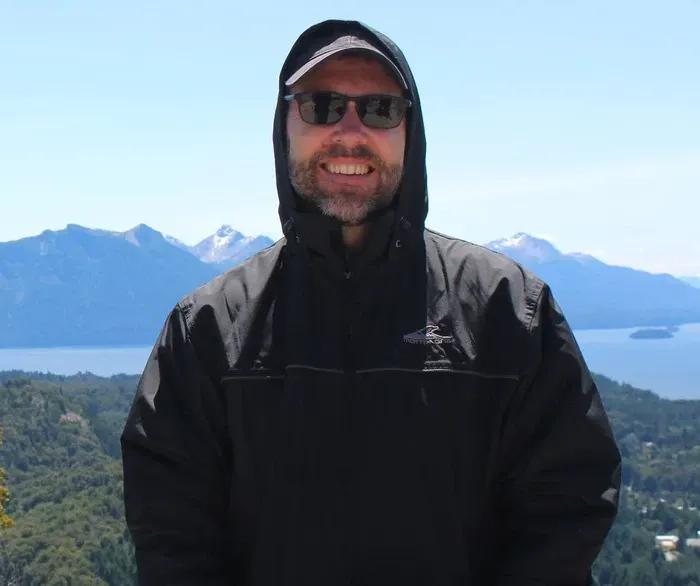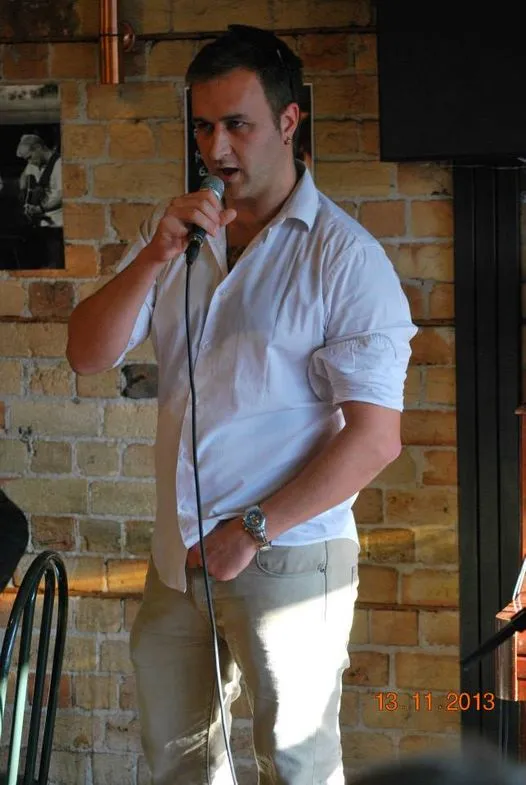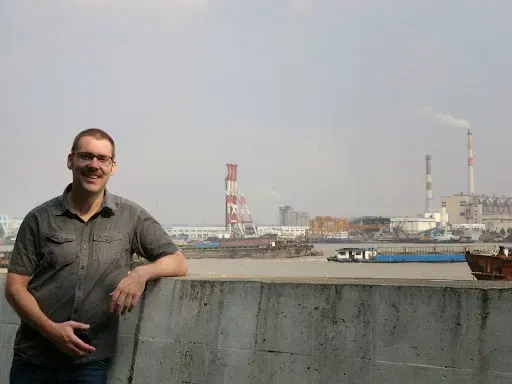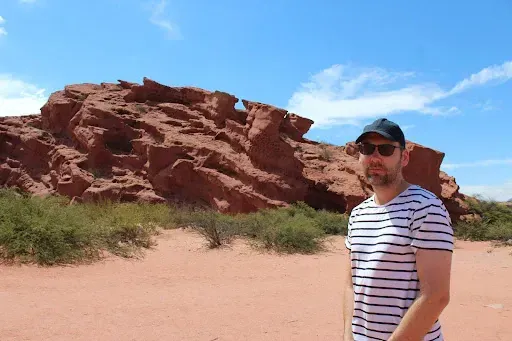Weary wordsmiths discuss what it means to be a writer in New Zealand

Author F.E. Beyer – a 43-year old Wellingtonian – is the well-travelled author of new crime novella Buenos Aires Triad, and specialises in writing about bad behaviour in exotic countries. His subjects have included tourist-robbing gangsters in Argentina, cotton picking in NSW, chemicals plants in China, and Ockers in Indonesia. True to Bukowski, Beyer has also worked in the post office and written the tale.
Author Michael Botur, a 37-year old communications writer and family man in Whangarei, is author of eleven books including seven books dwelling upon Kiwis with good intentions getting themselves into sticky situations, often breaking the law to try and solve their conflicts.
Beyer and Botur chat about the lifestyle of the male indie writer in 2021 – the glory, the ignominy, never being sure what other people think of us, devoting a big percentage of our lives to making thankless unpaid art… and getting beer bottles smashed on one’s head.
**
MICHAEL BOTUR: Fiction writing - unless you’re a James or a J.K. – is often unpaid, or lowly paid. We usually lose money through our creative writing, if you look at the rewards divided by the hours put in. Why do we do it?
F.E. BEYER: Last week I was walking down Lambton Quay in Wellington at 9 pm when someone threw a Steinlager bottle out of a fifth-story window and it shattered on the top of my head. There was blood everywhere. I was in shock at first but then I quite enjoyed talking to the paramedic, the police, and witnesses. However, I can’t say being a victim of this random act of stupidity was fun. But I can use it to write a tale entertaining for me and hopefully others. Writing allows me to do something positive with bad experiences. Also, I like taking up the challenge of telling a story well, something I don’t feel I can do to the same level in conversation. I want to show how people and events are linked together haphazardly. Most novels have plots that assume a far too logical and organised world. And what else am I going to do with all the useless facts I’ve collected over the years? In Buenos Aires Triad I wind Argentine history and a contemporary web of international pressures around the trajectory of a small cast of ne’er-do-wells, both small-time and big time.
MICHAEL BOTUR: Me, I write because I have ideas I want to communicate which I find difficult to suppress. For years before publicly publishing poetry and fiction and journalism, I wrote obsessively in journals, which shows that for whatever reason, I constantly want to capture thoughts and look at them a second time.
After I published my first few fiction stories, I started looking at how people responded to them. Nowadays there are few things I love better than reading a story aloud to somebody and seeing them react. It’s an extension of the desire to control other people. I have very little power in this world, I’m just one voice, so I like to put on a “play” in any story and show what can happen to characters when they pursue goals unwisely.
Anywho: You’re a responsible high school teacher. Does that conflict with your carefree traveller identity? And does anything in your life get sacrificed to squeeze the writing in?
F.E. BEYER: Yes, you are right: they are two different identities. One is my creation, the other is just a necessity. I was never a carefree traveller. They do exist, but these happy types were usually confident and well-adjusted back home. The person who travels to escape something in their own country and hopes to be carefree and happy elsewhere usually fails, but gains interesting experience – which inevitably no one back home wants to hear about! When I was living and working in other countries, it was hard to concentrate on writing. I think that was because my day-to-day living felt so intense. I remember meeting another Kiwi in a gym in Buenos Aires. He was a soap opera scriptwriter. He went to Buenos Aires to write because in Auckland he had too many social distractions. I was the opposite, in Buenos Aires, my social life was taxing, it never has been in NZ. Another factor inhibiting my writing overseas was that I drank a lot of alcohol – a common Anglo-expat problem. Around thirty-five my body couldn’t keep the pace anymore. I’m fairly settled now and have lots to write about.
MICHAEL BOTUR: Which pieces of your writing have been the hardest to create, and why?
F.E. BEYER: I wanted to write an awesome scene in an underground casino/gambling hall. I had two models for this and I knew I wouldn’t be able to reach the standard of either. The first was Chester Himes, an African American writer who wrote a successful series of comic crime novels set in Harlem. His sequences about playing craps (a dice game) in small gambling houses are fantastic. My other model was Kenneth Cook’s Aussie classic Wake in Fright. In this novel, they play ‘two-up’ in an Outback pub. This involves tossing two coins at a time and betting on the combinations of heads and tails that result. In Buenos Aires Triad, I wrote a chapter set in an illegal casino where Gustavo bets on scorpion fights. The scorpions do battle in the dark and punters can still see them as they glow. This is true, scorpions do glow in the dark. We aren’t quite sure why, but I thought this fact needed to be used in a book. It doesn’t happen in Argentina, but nobody who has read the book has told me this chapter is unbelievable. Most of the other looney scenes in my book, like criminals banking their cash with nuns, are based on true events. So the scorpion fighting chapter was hard to write, it required me really to put imagination to work. I’m relatively happy with the result.
China was hard to write about, too. I lived there for four years. For most Westerners in China, the place is so different from what they are used to that they all experience it the same way. Many people have gone there and thought they were Marco Polo – as in the first foreigner to understand China, but what they write about it is far from original. Also, in the 21st century, there have been so many books written about China so it’s hard to think of what might be worthwhile adding. I spent a year in Wuhan – the home of Covid-19. It was a very odd place that nobody had heard of back in 2004. I wish I had something great to write about my time there but I don’t.
MICHAEL BOTUR: Are there any things you have written which you regret?
F.E. BEYER: I published a book of short stories in 2012. Later I regretted doing so because the stories weren’t very well developed. I took the eBook offline and there were never any paperback copies so it was a good save. A guy I knew who was setting up a small press edited and published it. He was very helpful. But I learnt it is better to have full control of my projects. As a self-published author, you can always tidy up typos and mistakes on your manuscript on Amazon, Kobo etc. Also, whether you self-publish a book or get it accepted by a small press, you are going to be doing the book marketing yourself anyway.
MICHAEL BOTUR: Which places around the world have most inspired your writing?
F. E. BEYER: I mentioned that I find China hard to write about above, but it did inspire me. When I went there in 2001 it blew my mind. I never got it together to write much about China beyond some articles in the Los Angeles Review of Books, China Channel and now it feels way too late to write a book set there. However, the knowledge I gained there helped me create the character of Ping the triad boss in my novella.
Argentina, specifically the capital of Buenos Aires inspired me, both in terms of my experiences living there and spending many hours reading the crime sections in local newspapers. The bizarre and sensational events reported daily were an eye-opener for someone used to the brief crime sections in NZ papers.
Other places I lived like Brazil, Indonesia and Australia have turned up in my short stories. In NZ, I found working in the post office to be a job that got me writing. When I was there they were in the process of changing from delivering mail on pushbikes to electric buggies. This change took the charm of the job away but caused a lot of interesting internal conflicts in the organisation. Bukowski’s novel ‘Post Office’ is the only book I’ve read which really shows what it’s like to have a mundane job – and it’s such an entertaining novel. Hopefully, I can emulate this down the track. I don’t think I’ll ever write anything about teaching if I can avoid it.
F.E. BEYER: Michael, some of your characters are attracted to gangs and drugs despite a decent family background. I see young men trying to be cool every day in my job. It can be a struggle to grow out of this. Is that something that you have gone through?
MICHAEL BOTUR: Crimechurch, my big novel, has people in various stages of trouble, remorse, immaturity and maturity. I’ve been through all of those stages myself. I went crazy when I was 18 in Christchurch, though alcohol was the only drug I got into. I did a lot of damage to people and property because indeed, yup, I decided it was “cool” to do violent risk-taking behaviour every day - and I was very impressionable. Each time I read about a rockstar or writer or crim doing wild things, it reinforced my sense of privilege. In particular, the raging-against-the-system of Irvine Welsh’s characters made sense to me. I thought the world was a playground in which I could act as wildly as I liked. I’m a whole ‘nother lifetime beyond 18 year old Mike now, though, but Crimechurch was a book that would have really resonated with the younger me.
F.E. BEYER: You’ve written a lot of fiction about crime and drugs. Is there another genre you would like to try? Like non-fiction or horror?
MICHAEL BOTUR: Yes and yes. I’ve just completed a collection of horror stories which will be published in 2022 and I’ve won this award for one story called the Robert N Stephenson Australasian Horror Writers Association Short Story competition.
As for non-fiction, totally. I get paid to write journalism every week.
I write in many genre because the Ockhams and literary journals are a disappointment and literary fiction rarely gets made into TV and film.
F.E. BEYER: You’re a fan of Alan Duff and he has endorsed you as a writer. How did you come to be in communication with him? And how do you make contact with other writers in general?
MICHAEL BOTUR: I got Alan’s email address from a mercurial journalist when he was in a good mood. How do I make contact with other writers? Twitter, usually.
F.E. BEYER: I’m a New Zealander but I am completely removed from the NZ writing scene – and so it was great to be in contact with you. What have been your frustrations with publishing in NZ? I imagine there are some scary politically correct gatekeeping boogie people out there? Also, what are the positives about the NZ writing and publishing landscape?
MICHAEL BOTUR: You have to be stoic and you have to adjust your mindset. Being stoic should mean you’re not too ruffled by the gatekeepers, but you have to accept that you can’t dwell on the highs too much either. We are an incredibly literate country and we produce a high proportion of writers, readers and publishers per capita, so that gives you an increased number of competitors as well as supporters… plus shitloads of writing courses to upskill you. There is no money in publishing fiction in NZ, but it’s a safe, supportive country to do it in. As a writer in NZ, you will probably never get stopped on the street by fans. Instead, try appreciate that you live in a country where you are free to write anything.
Even if only a few people understand that your writing covers an important area of the world which would be otherwise neglected - such as covering the expat experience, or urban privileged violent Christchurch angst - you only need 1000 true fans to sustain you.
F.E. BEYER: Your final thoughts on what it means to be a weary wordsmith?
MICHAEL BOTUR: If you have passionate artistic expressiveness pouring out of you, you won’t be able to bottle it. If you’re not meant to be a writer, you’ll simply stop. But if being a writer is really part of your DNA, it will come out of you like steam leaking from a pressure cooker. Let it flow and it will give you a more satisfying life. Besides, you need some sort of achievement to put in your obituary.


